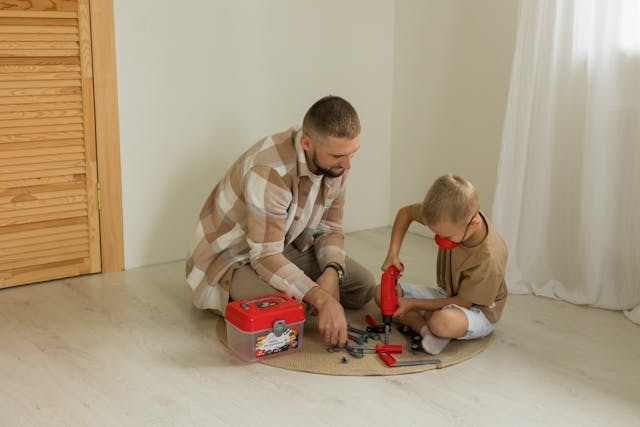10 Habits That Are Destroying Families

Families are supposed to be the place where we find love, support, and stability. But over time, certain toxic habits can creep into family life, slowly eroding the trust, respect, and connection that keep a family strong. These habits may seem harmless at first, but if left unchecked, they can have a devastating impact on family bonds.
Whether it’s poor communication, neglect, or emotional manipulation, the habits listed below have the power to destroy families from the inside out. If you’re looking to build or maintain a strong, healthy family dynamic, recognizing and eliminating these habits is the first step.
1. Poor Communication
Communication is the cornerstone of any healthy relationship. Without clear, honest communication, misunderstandings, hurt feelings, and resentment build up over time. Families often struggle with communicating openly, leading to suppressed emotions, unresolved conflicts, and a lack of understanding.
Why It’s Destroying Families:
When family members fail to express their thoughts, feelings, and needs, it creates a breeding ground for misunderstandings. Miscommunication often leads to bigger issues down the road because people assume things about one another instead of discussing them openly.
How to Fix It:
- Practice active listening and ensure everyone feels heard.
- Encourage open, respectful conversations where feelings are expressed without judgment.
2. Constant Criticism
We’ve all been guilty of offering unsolicited advice or a sharp word during a disagreement, but constant criticism can be toxic to family relationships. When one family member is continually criticized, it erodes their self-esteem and creates a hostile environment. Over time, the targeted individual may withdraw emotionally or begin to resent the critic.
Why It’s Destroying Families:
Frequent criticism undermines trust and makes family members feel unloved or unappreciated. If the criticism is not constructive, it can lead to emotional distance and even cause emotional trauma. When family members feel that they are never good enough, they may stop engaging altogether.
How to Fix It:
- Focus on positive reinforcement rather than pointing out flaws.
- Provide feedback in a supportive and constructive manner, ensuring it’s for growth rather than personal attack.
Don’t Miss: 10 Sentences I Wish I Read In Life Earlier
3. Avoiding Difficult Conversations
Difficult conversations are uncomfortable, but avoiding them doesn’t solve anything. Issues like money problems, infidelity, or emotional struggles don’t disappear if ignored—they only fester and grow. Families that avoid addressing their problems head-on are setting themselves up for bigger conflicts in the future.
Why It’s Destroying Families:
Avoiding important conversations can lead to misunderstandings, resentment, and an inability to resolve conflict. When sensitive topics are brushed under the rug, family members may begin to feel emotionally neglected or rejected, making it harder to rebuild trust.
How to Fix It:
- Face tough topics together, even if it’s uncomfortable.
- Approach sensitive conversations with an open mind and a commitment to finding solutions.
4. Neglecting Emotional Needs
Physical needs—like food, shelter, and clothing—are essential, but emotional needs are just as important. Neglecting the emotional well-being of family members can lead to feelings of loneliness or disconnect. When one member of the family feels emotionally neglected, it impacts the whole family unit.
Why It’s Destroying Families:
Emotional neglect can make family members feel like their needs are not a priority. This creates emotional distance, leading to a breakdown in intimacy, affection, and support. Over time, the lack of emotional care can tear families apart.
How to Fix It:
- Make emotional well-being a priority by regularly checking in with each other.
- Offer emotional support and be empathetic to each other’s feelings and challenges.
You May Like: 10 Signs You’re Doing Well In Life
5. Failing to Set Boundaries
Boundaries are vital in any relationship, including family relationships. Without healthy boundaries, family members can easily overstep each other’s personal space, emotional limits, and privacy. When boundaries are ignored, it can lead to feelings of resentment and frustration.
Why It’s Destroying Families:
A lack of boundaries makes it difficult for family members to maintain a healthy distance, leading to intrusion or over-dependence. This can cause emotional strain, where family members feel overwhelmed or suffocated.
How to Fix It:
- Establish clear boundaries about what is acceptable and what isn’t.
- Respect each other’s personal space, time, and needs.
6. Playing the Blame Game
Constantly blaming each other for problems within the family only fuels conflict and prevents personal accountability. In families where members blame one another for everything that goes wrong, no one feels responsible for making things better. This creates a toxic cycle of anger, guilt, and disappointment.
Why It’s Destroying Families:
When blame is constantly placed on others, it breeds negativity and bitterness. Family members become defensive and resistant to solutions, as no one wants to take responsibility for their actions. Over time, this leads to a lack of cooperation and division within the family.
How to Fix It:
- Encourage personal responsibility and work together to find solutions.
- Focus on constructive problem-solving rather than assigning blame.
7. Constantly Hiding Feelings
It’s common to suppress emotions, especially in family settings where people want to avoid drama. However, constantly hiding your feelings can lead to emotional buildup, which often erupts in unhealthy ways later. Unexpressed emotions can also cause distance and misunderstanding between family members.
Why It’s Destroying Families:
When you don’t express your emotions openly, it leads to feelings of alienation and resentment. People might start feeling like they’re living with strangers in their own homes. Without expressing feelings in a healthy way, emotional connections fade over time.
How to Fix It:
- Encourage an environment where everyone feels safe to express their feelings.
- Practice active listening and validation, especially when emotions are high.
Don’t Miss: 10 Psychology Tricks That Are Used By High IQ People
8. Financial Mismanagement
Money problems are one of the top reasons families fall apart. Whether it’s debt, poor budgeting, or different financial priorities, financial mismanagement can create huge stress in a household. Money issues can also lead to arguments, resentment, and a feeling of being trapped or hopeless.
Why It’s Destroying Families:
If financial issues aren’t addressed, they can cause major tension between partners or family members. Money problems often lead to feelings of insecurity, stress, and conflict, making it difficult for families to move forward and prosper together.
How to Fix It:
- Set up a budget and have regular discussions about money management.
- Be transparent about financial goals and challenges, and work together to find solutions.
9. Holding Onto Grudges
Holding onto grudges can create a toxic family environment where old conflicts keep resurfacing. When family members refuse to forgive and move on from past mistakes, it creates a never-ending cycle of bitterness and unresolved tension.
Why It’s Destroying Families:
Unresolved grudges prevent healing and perpetuate negative feelings. Every interaction becomes clouded with resentment, making it harder to move forward and build positive memories together.
How to Fix It:
- Practice forgiveness and let go of past mistakes.
- Focus on growth and moving forward, not holding onto old arguments.
You May Like: 10 Psychology Signs to Spot Haters
10. Taking Each Other for Granted
It’s easy to assume that the people closest to you will always be there. But taking your family for granted—whether it’s through neglecting their emotional needs, assuming they’ll always forgive you, or failing to show appreciation—can lead to feelings of resentment and disconnect.
Why It’s Destroying Families:
When you take family members for granted, you stop appreciating the effort they put into the relationship. This can create emotional distance and lead to a situation where one or more members feel unvalued and underappreciated.
How to Fix It:
- Regularly express gratitude and appreciation for your family members.
- Show your love through actions—whether it’s helping with chores, spending quality time, or simply saying thank you.
Final Thoughts: Break the Cycle
Toxic habits, if not addressed, can slowly chip away at the foundation of family relationships. However, recognizing these habits and actively working to break the cycle is the first step toward building a stronger, healthier family. Change may not happen overnight, but with effort, patience, and a commitment to better communication and understanding, families can overcome even the most deeply rooted issues.
FAQs:10 Habits That Are Destroying Families
- How do I stop repeating unhealthy family patterns?
The first step is to acknowledge the patterns and openly discuss them as a family. Seek help if necessary, such as therapy or counseling, to facilitate healthier communication and behavior.
- How do I handle financial problems in my family?
Start by having open, honest conversations about your financial situation. Create a budget together and set achievable goals to work towards as a family.
- Can I rebuild my family after years of conflict?
Yes, it’s possible. Start with forgiveness, focus on improving communication, and be consistent in your efforts to rebuild trust and understanding.
- How can I encourage my family to communicate more openly?
Create a safe space for communication where everyone feels heard and respected. Be patient, and encourage active listening to foster healthier conversations.
- What can I do if my family is stuck in a cycle of grudges?
Encourage forgiveness and seek professional guidance if necessary. Help each family member understand that letting go of grudges is essential for emotional healing and a stronger family unit.






